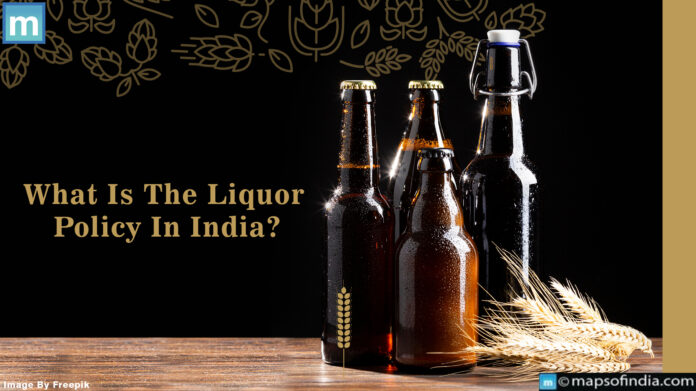High taxes and onerous licensing requirements exacerbate consumer financial difficulties and corruption in the liquor industry. The Directive Principles of State Policy (Article 47) serve as the impetus for the ban on alcohol consumption, which is intended to safeguard the public’s health. Although not legally binding, these guidelines direct state action. Furthermore, the 7th Schedule provides that national legislatures have the power to regulate alcohol, considering state-specific legislation ranging from private sales to prohibition.
Power Sharing for Alcohol Regulation in India
Central Authority
- Suggests import taxes for imported alcoholic beverages.
- Creates regulations at the federal level about the marketing, promotion, and advertising of alcohol.
State Administrations
- The State List (List II) of the Seventh Schedule applies to liquor.
- Put state-specific sales taxes and excise fees on alcoholic beverages.
- Publish licences for the import and domestic distribution of alcoholic beverages.
- Establish regulations for the import of alcoholic beverages and approved hours of operation for bars and liquor stores.
- Establish laws prohibiting it in qualifying states (like Gujarat and Bihar).
- Permit the import of alcohol via government-owned retailers, such as TASMAC, in Tamil Nadu.
- Introduce home delivery services and online liquor sales (e.g., Maharashtra and Delhi).
State approaches to alcohol legislation differ from one another
- Revenue-Driven Policies: States that prioritise alcohol sales, such as Delhi and Haryana, have a significant number of liquor stores.
- Socio-cultural considerations: Bihar has prohibition due to socio-economic considerations, but Gujarat has prohibition due to historical and cultural reasons.
- Government Control for Safety: In response to alcohol-related incidents, Tamil Nadu’s State Marketing Corporation controls the sale of alcoholic beverages to improve public safety.
What is the liquor policy scam in Delhi?
- Allegations of corruption and favouritism in the execution of Delhi’s excise policy from 2021 to 2022 are part of the Delhi Liquor Scam. The coverage sought to restructure the alcohol industry by bringing in private enterprises, but there have been claims that it favoured some groups with waivers, fee cuts, and multiple licences.
- The AAP government raises the issue of extended sales similar to Punjabi rules while denying any misconduct. Nonetheless, the strategy encountered obstacles, including opposition from officials and the LG’s order to cease execution, which resulted in its retraction.
- A few states have partial bans, and five have complete prohibitions (Bihar, Gujarat, Lakshadweep, Nagaland, and Mizoram).
- Weak Enforcement of Regulations: Alcohol businesses violate advertising limits during major events, such as the Cricket World Cup, without government action.
- Exclusion from GST: States desire character control over regulations. Thus, they hesitate to include alcohol under the GST because of concerns about sales. By including alcohol, taxation should be made simpler and consistent with other items.
- Over Taxation: The financial burden of high home and customs duties, which surpass 200% and 150%, respectively, falls on consumers.
- Impact on Health: Because of high taxes, consumers choose less expensive, lower-quality alcohol, which raises fitness hazards, particularly among lower-quality agencies.
- Hooch tragedies, incidents in which alcohol made illegally results in contamination or fatalities, happen regularly.
- Government Monopoly in Sales: Present laws give the government monopolies over the import of alcohol, which undoubtedly encourages corruption and impedes the efforts of private organisations.
Practical solutions for alcohol policy issues
- Put Liquor Under GST: For a more efficient tax system, tax alcohol similarly to cigarettes. This will simplify taxation.
- Shifting from government monopolies to personal liquor distribution that is controlled for protection and age restrictions is recommended to reduce corruption and encourage economic diversity.
- Adopt New Licensing Procedures: Streamlining the licensing procedures for importing alcohol in public areas will reduce bureaucratic barriers and promote a more conducive climate for commercial enterprise.
- National Policy with a Health Focus: Establish nationwide alcohol policies that prioritise public health before profit and align with the WHO’s guidelines to limit alcohol consumption.
- Advocacy Law: Implement more stringent guidelines to outlaw alcohol promotion and regulate liquor companies’ use of surrogate marketing.




